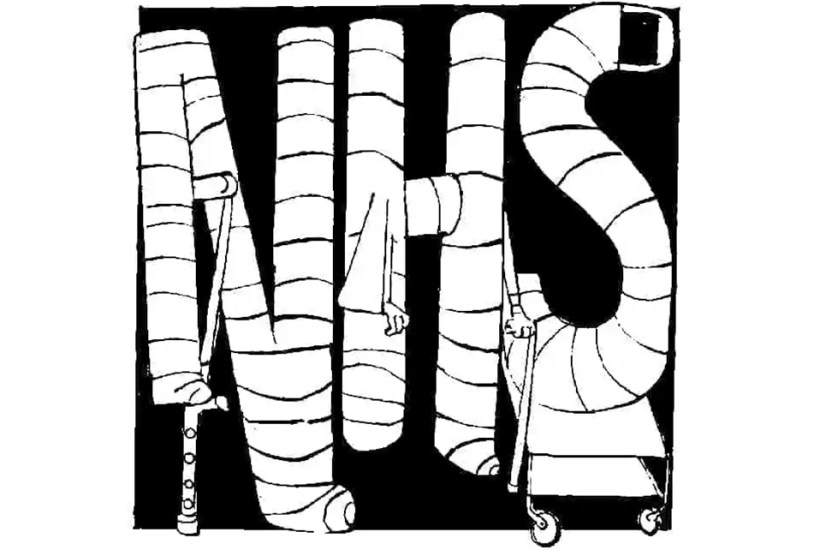Having lived in the United Kingdom for almost my whole adult life, I like to think I’m well assimilated. I stopped trying to make pleasantries with strangers a long time ago. I skip dinner to stand outside the pub in the dark. Apart from my accent (though Americans tell me that’s changed, too) I think I can just about pass as British. But never for long. At some point, someone starts talking about a health worry or new ailment, and I tell them to see the doctor. Suddenly, the jig is up, and I’m an outsider again.
I’m now very familiar with the British aversion to seeking medical care. Still, it horrifies me. I sound like a broken record around friends and colleagues, as I repeatedly tell them to go and get their problems checked out. It’s as if I’m speaking a foreign language that simply does not translate. Sometimes I’m met with confused stares or awkward laughter. Mostly I’m met with bafflement, as if I’ve just suggested they deal with a mole on their wrist by sawing off their arm. Going to the doctor: what a crazy thing to do.
The crazier thing to do, I’d say, is to live with ongoing pain. I’ve got the rest of the world backing me up on this one. Non-Brits are totally perplexed by the relationship between Brits and their healthcare. On the one hand, ‘universal’ access to the National Health Service is held up as the UK’s crowning achievement; on the other, its residents try as hard as they can not to go anywhere near it.
Of course, there is an easy rebuttal to my advice at the moment: who can access health services right now, even if they wanted to? The NHS is in ruins after the pandemic, and the situation is made worse by the ongoing strikes which mean hundreds of thousands of cancelled appointments.
If you’re lucky enough to see your GP in a decent time frame, you risk having your name added to a 7.6 million-strong waiting list if any serious problem is found. An understandable conclusion to all this might be: what’s the point in trying?
I’m never one to shy away from highlighting how the NHS fails its patients. (A study from the King’s Fund earlier this year found the NHS ranked second-to-last on its list for saving patients with treatable illnesses. They are seen too late.) But it is only in countries where so many people deliberately put off diagnosis and treatment can such archaic systems survive.
Americans might put off going to the doctor because they are afraid of the costs. In the UK, it’s a different problem. My friends would tell me in our twenties that they ‘wouldn’t bother’ the GP with their health issues because appointments were limited and should go to those most in need. It’s a sacrifice that seems rather noble until you realise that people in their sixties and seventies are doing the same. The average household is paying thousands of pounds a year in tax for healthcare, yet it seems everyone is staying home to help each other. Perhaps this is how my GP surgery gets away with keeping its doors closed over the weekend.
It’s this sense of sacrificial duty that was exploited at the height of the pandemic, when people were told to ‘stay home’ to ‘protect the NHS’. The government’s ‘look him/her in the eyes’ campaign, featuring photos of gravely ill Covid patients asking if you could ‘tell him/her you never bend the rules’ didn’t explicitly ask if your health problem was worth a trip to A&E. It didn’t need to be said: after years of conditioning, Brits understood the calling.
The fear pre-dates the pandemic. Back in 2018, 60 per cent of Brits were already reportedly putting off seeking medical care because they were afraid of what might be discovered. In the words of one of my colleagues: ‘They never tell you anything good’ – so why volunteer to hear some bad news?
This is what happens when a health system essentially abandons preventative healthcare. I learned this years ago, when I rang my GP surgery to schedule a routine health check, only to be told to call back when I turned 40. No one here sees the GP when they’re healthy or when ailments can be treated at an early stage. Their only experience with the doctor comes when things have progressed to a far worse diagnosis.
If the system rejects you, reject the system. That’s why Brits take pride in not seeking medical care. Bring up the subject of GP appointments, and everyone starts competing – not over how recently they got a check-up, but how long it’s been since they’ve been to the GP. I often leave the room, as I simply can’t compute what I’m hearing – five, seven, ten years without being seen. A friend of mine in his early thirties is using his holiday to pick out ‘banger’ hymns for his funeral one day, while also bragging to me that he hasn’t been to the GP for almost a decade.
Illness eventually catches up with the healthiest of us. I’ve had more luck in recent years convincing colleagues and a few friends to go and see my private GP, who is usually available to see them on the day (The Spectator offers health insurance, making this a realistic course of action). It’s always a battle – against some variant of the stiff upper lip, perhaps. What I find remarkable and harrowing is how that pretence is kept up when lips are quivering, the pain is too much and a doctor is so obviously needed.
My most recent success was getting a colleague to have a bug bite seen to, which was close to hospitalising her within hours. Thankfully, all turned out well. But my success was fleeting, as it was largely agreed by our friends that she had timed her trip to the GP perfectly, while I maintained she should have gone a week earlier. Still, I’ll take the small win.
Got something to add? Join the discussion and comment below.
Get 10 issues for just $10
Subscribe to The Spectator Australia today for the next 10 magazine issues, plus full online access, for just $10.
You might disagree with half of it, but you’ll enjoy reading all of it. Try your first month for free, then just $2 a week for the remainder of your first year.















Comments
Don't miss out
Join the conversation with other Spectator Australia readers. Subscribe to leave a comment.
SUBSCRIBEAlready a subscriber? Log in